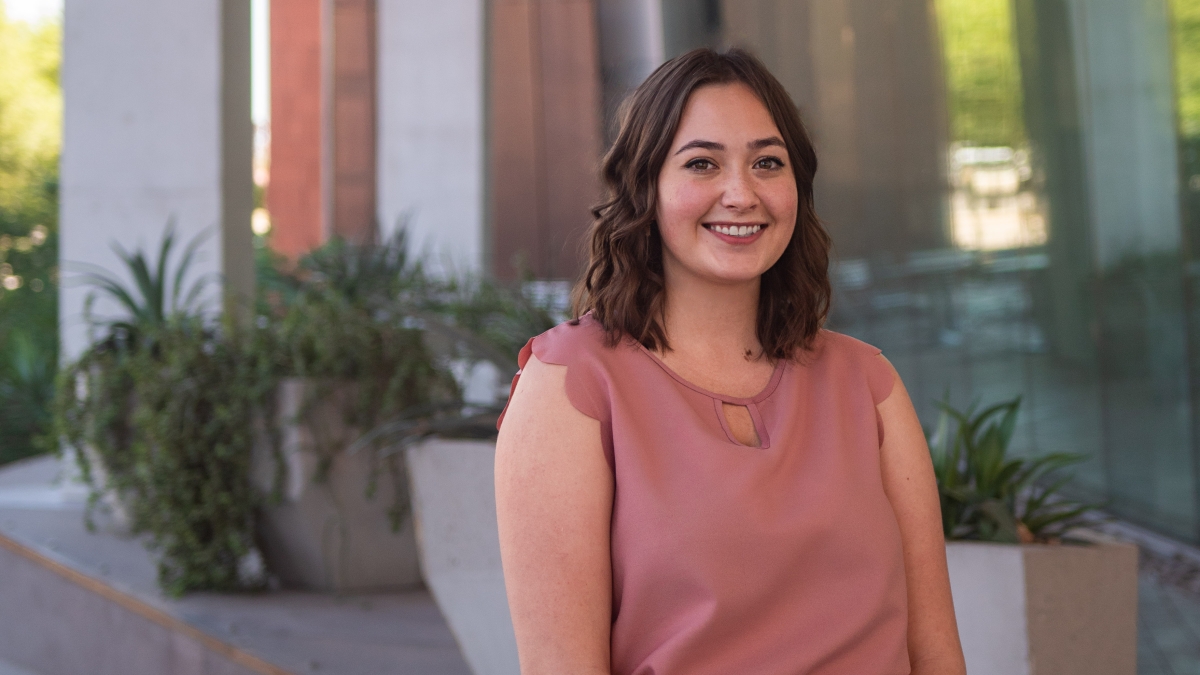Psychology student aims to change how refugees access mental health resources

Isabel Glass is a senior studying psychology with a minor in global studies and will be starting a master’s degree in social justice and human rights. Photo by Robert Ewing/ASU
Arizona State University student Isabel Glass wants to find better ways for immigrants and refugees to integrate within our society.
Currently a senior studying psychology with a minor in global studies, she will be starting a master’s degree in social justice and human rights as part of her 4+1 program.
She started her academic career as an undergraduate business student before she realized that her interests resided in the human condition and studying behavior. Another of her long-term goals is to develop methods of acceptance for and remove cultural barriers to mental health.
“I wanted to keep some essences of nonprofit organization and volunteering and the degree in psychology gave me the flexibility to pursue both while also conducting research,” Glass said.
Glass’ honors thesis focuses on the efficacy of the nonprofit War Child USA and its effectiveness on reintegration and psychosocial development of children in war-torn countries. Current estimates done by UNICEF show that more than 1 in 10 children worldwide are affected by armed conflict. The effects of that conflict are both direct and indirect and are associated with immediate and long-term psychological and physical harm.
War Child USA aims to protect children from the impact of war through a community-driven approach, with local staff and support. The multinational program currently assists children in Uganda, South Sudan, Sudan, the Democratic Republic of Congo, Kenya, Iraq, Afghanistan, and with Syrian refugees in Jordan.
“My thesis will focus on the models that they use for developmental psychopathology and not just how psychology affects the individual and community, but also at the larger economic or sociopolitical level,” Glass said.
“Ultimately, the refugee crisis is staggering and I want to work towards getting rid of the hate and stigma towards those communities.”
Through her experiences at ASU, Glass found that she has a passion for understanding different cultures and the people involved in order to really make positive change.
“You can’t just come into a community that you don’t know and prescribe ways to improve their lives. There are so many cultural nuances and significant biases that we need to be aware of before we can work collectively to make a difference,” Glass said.
Her journey toward her master’s degree in social justice and human rights began with connecting with Elizabeth Nelson, a clinical assistant professor in the Department of Psychology who worked with UNICEF in the past, and continued with Glass’ time as a research assistant in the Human Generosity Project and with the Cooperation and Conflict Lab.
The Human Generosity Project is a joint research project with Athena Aktipis, an associate professor of psychology at ASU, and Lee Cronk, a professor of anthropology from Rutgers. This project is the first large-scale cross-disciplinary research project to investigate the interrelationship between the biological and cultural influences on human generosity, or giving without reciprocation. The lab uses a mixture of methodologies such as fieldwork, computational modeling and experiments to understand the complex nature of human generosity among small-scale populations around the world.
Her graduate mentor, Jessica Ayers, has been impressed with Glass’ work in the lab as well.
“Isabel is great to work with," Ayers said. "She is both a psychology and global studies major and is passionate about refugee and immigrant studies. She joined our lab to learn more about the Human Generosity project as a way to explore current research that is going on at ASU and find synergies with her own interests. Isabel has helped me a lot with one of my projects that deals with familial conflict. She brought a fresh perspective to the research and loved to talk about how conflict with family members differed depending on if the families were from Western samples or ethnographic data.
"Isabel always speaks up during lab meetings, and asks very intuitive questions — it is clear that she is very curious and eager to learn more about the science behind social relationships.”
Getting involved on campus
Glass’ biggest piece of advice to other students is to find out what you are interested in and pursue it, because there is likely a club on campus dedicated to what you care about.
One such club for Glass is the United Nations Association of the United States of America (UNA-USA). Members of the UNA-USA chapter at ASU act as ambassadors for the United Nations and work to educate themselves and others on the vital work of the U.N. and to advocate for global issues they care about most.
“The great thing about the UNA at ASU is that there so many capacities of getting involved, with goals ranging from climate action to women and gender violence, to good health and well-being,” Glass said. “Students can attend summits or even serve as Millennium Campus fellows. All you need is a desire to be involved and there is a place for you.”
More Science and technology

ASU-led space telescope is ready to fly
The Star Planet Activity Research CubeSat, or SPARCS, a small space telescope that will monitor the flares and sunspot activity…

ASU at the heart of the state's revitalized microelectronics industry
A stronger local economy, more reliable technology, and a future where our computers and devices do the impossible: that’s the…

Breakthrough copper alloy achieves unprecedented high-temperature performance
A team of researchers from Arizona State University, the U.S. Army Research Laboratory, Lehigh University and Louisiana State…

